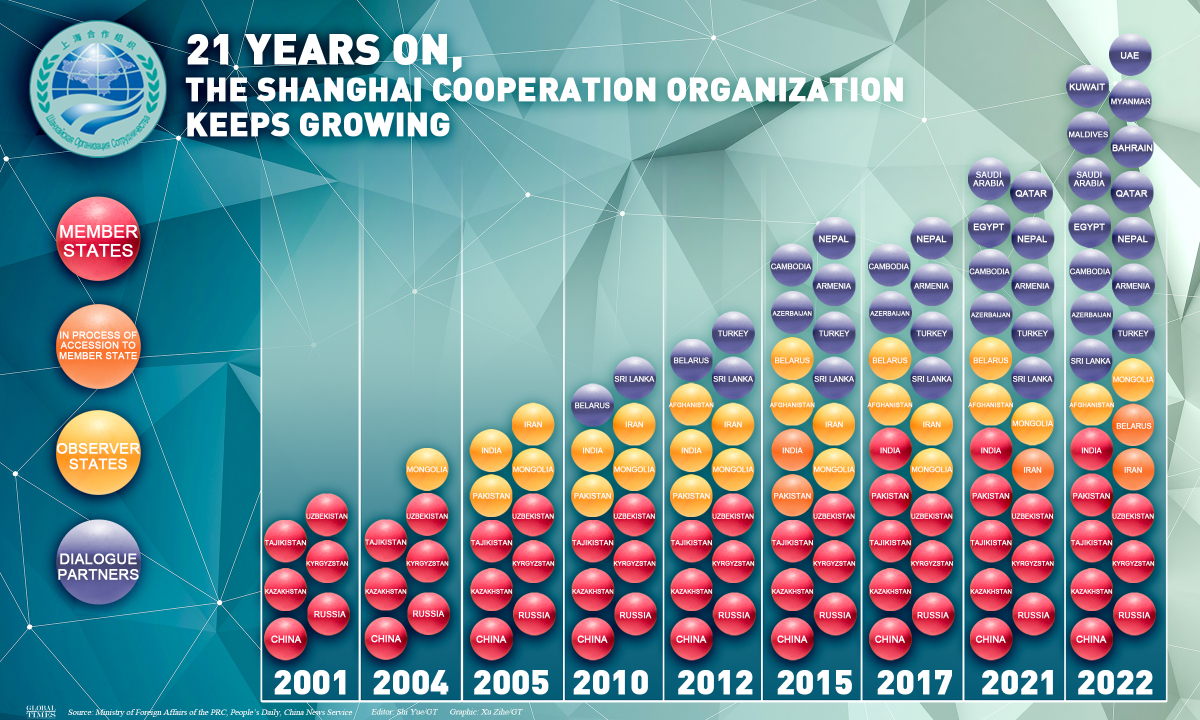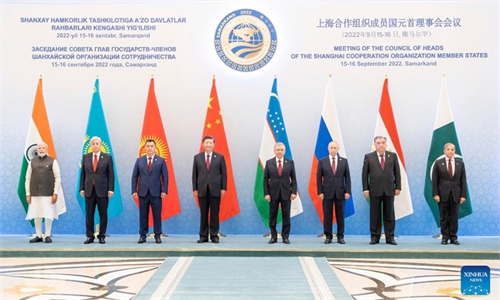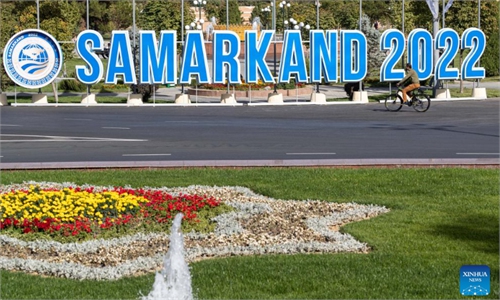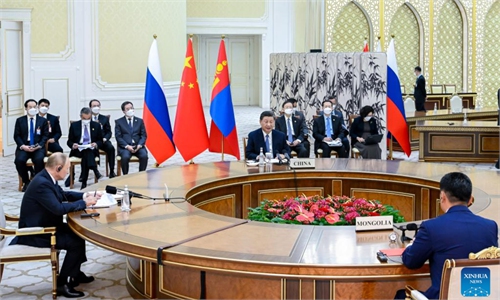Xi's trip to Central Asia ‘breaks US encirclement’ with ‘a circle of friends at SCO’ : Chinese FM Wang Yi
Chinese President Xi Jinping (seventh from left, front) and leaders of other Shanghai Cooperation Organization (SCO) member states, observer states and dialogue partners pose for a photo before the 22nd meeting of the Council of Heads of State of the SCO on September 16, 2022, in Samarkand, Uzbekistan. Photo: Xinhua
Chinese President Xi Jinping's trip to Central Asia from Wednesday to Friday is a strategic move to break US' "encirclement" of China by expanding the "circle of friends" at the Shanghai Cooperation Organisation (SCO), demonstrating President Xi's confidence and influence, while indicating the further strengthening of China's international status and influence, Chinese State Councilor and Foreign Minister Wang Yi said at the end of the trip, noting that this is also the general view of the international public opinion.
President Xi's attendance of the 22nd meeting of the Council of Heads of State of the SCO and state visits to Kazakhstan and Uzbekistan is his first overseas trip since the onset of the COVID-19 pandemic. Despite the tight schedule, there are many highlights and fruitful results, which have strongly pushed the expansion of the SCO and brought China's relations with relevant countries to a new level, Wang said in a statement released on the website of Chinese foreign ministry.
Wang pointed out that the visit is of great significance. It is a major diplomatic action taken toward Eurasia, and is a landmark and important visit carried out at a key historical point.
President Xi summarized the successful experience of the SCO, namely, adhering to political trust, win-win cooperation, equality between nations, openness and inclusiveness as well as equity and justice, Wang said, noting that it is an important guide to the promotion of healthy and just development of international relations.
In stark contrast to the spirit of the SCO, the US-led West is trying to build a Cold War-style alliance based on ideological criteria, leading to the wave of counter-globalization and confrontational split that the world is now experiencing, Deng Hao, secretary-general of the China Center for SCO Studies, told the Global Times on Saturday.
The US-led West is now putting extreme pressure on Russia while not reducing its containment of China, Deng said. "The geopolitical stakes are at an unprecedentedly high level. Against this backdrop, the sense of crisis and uncertainty facing the vast majority of developing countries has clearly increased."
"Countries that have not entered the West's 'small clique' have attached great importance to this visit of President Xi and are eagerly looking forward to his visit," Deng said. "This visit is believed to bring confidence and hope to the world."
"Because they saw China's development, and are more in agreement with the ideas and propositions put forward by China," he said.
At the summit, Iran officially became a full SCO member. China and other SCO members also started the procedure for Belarus' accession, granted Egypt, Saudi Arabia and Qatar the status of SCO dialogue partners, and reached agreement on admitting Bahrain, the Maldives, the United Arab Emirates, Kuwait and Myanmar as new dialogue partners.
Wang noted that the new round of the largest expansion of the SCO membership has consolidated its status and influence as the most populous regional cooperation organization with the vastest territory in the world.
This expansion fully demonstrates that the SCO is not a closed and exclusive "small clique," but an open and inclusive "big family," he added.
The US seems to be doing well with its bloc diplomacy and small cliques, but actually there are only 20 to 30 countries that really follow the US or are included in the clique, Deng explained.
"But there are more than 200 countries around the world, the vast majority of which do not follow the US and many are fed up with the selfish and self-serving attitude of the superpower."
"More countries have asked to join the SCO as they want to get a sense of stability, security and development, that is, a chance to get out of trouble and achieve revitalization," Deng said.
He noted that after absorbing the new members, the SCO now represents nearly half of the world's population and 60 percent of the Eurasian continent. It also has the conditions and capacity for a greater role in global oil.
These new countries joining the SCO have previously established good relations with China in cooperation. With their accession, the concept of "Belt and Road Initiative" and "a community with a shared future for mankind" will be spread more widely, Deng noted.

The Shanghai Cooperation Organization member states signed an MOU on including Iran as a new member and began the process to admit Belarus as a member. 21 years on, SCO, the world's largest regional organization in terms of geographic scope and population, keeps growing. Editor: Shi Yue/GT Graphic: Xu Zihe/GT
Observers noted that for countries around the world, the core of SCO's appeal is that its philosophy is different from and beyond the West - partnership without alliance, cooperation instead of confrontation.
"Whereas Western alliances impose leaders versus followers' roles, and require unified values and mandatory obligations to be fulfilled, SCO's cooperation is an inclusive and open one," Deng said.
"This is in line with the trend of the world's development of the times, and in fact, in line with the actual needs of each region, representing the trend of history," Deng said.
Wang said that in Samarkand, President Xi attended bilateral meetings with 10 leaders participating in the SCO summit. President Xi also attended the meeting of heads of state of China, Russia and Mongolia. The meetings play an important role in guiding the development of bilateral relations and boosting regional peace and stability.
China's voice, position and philosophy were fully conveyed at the summit and during the bilateral and multilateral meetings of leaders, Deng told the Global Times.
"Many of the initiatives put forward by President Xi were positively received at the summit, as evidenced by the number of joint communiqués in which many leaders responded positively to the ideas put forward by China and expressed their willingness to work together with China to implement them."
Deng noted that it is clear from this summit that in the context of increasing geopolitical risks, countries are turning to China to maintain their hopes for security and economic development.
"We should believe that under the leadership of new ideas and propositions like China's, and with the joint efforts of all countries, our world will not become more and more divided and confrontational," he said. "Peaceful development and cooperation are still the mainstream."
During the meetings, the leaders reiterated that their countries will continue to firmly abide by the one-China principle, firmly support China's stance on issues concerning its core interests, including those related to Taiwan, Xinjiang and Hong Kong.
The leaders wished the upcoming 20th National Congress of the Communist Party of China a full success, expressed full confidence in China's future development, hoped to comprehensively enhance mutually beneficial cooperation with China, and expected China to play a bigger role in international affairs, Wang said.



